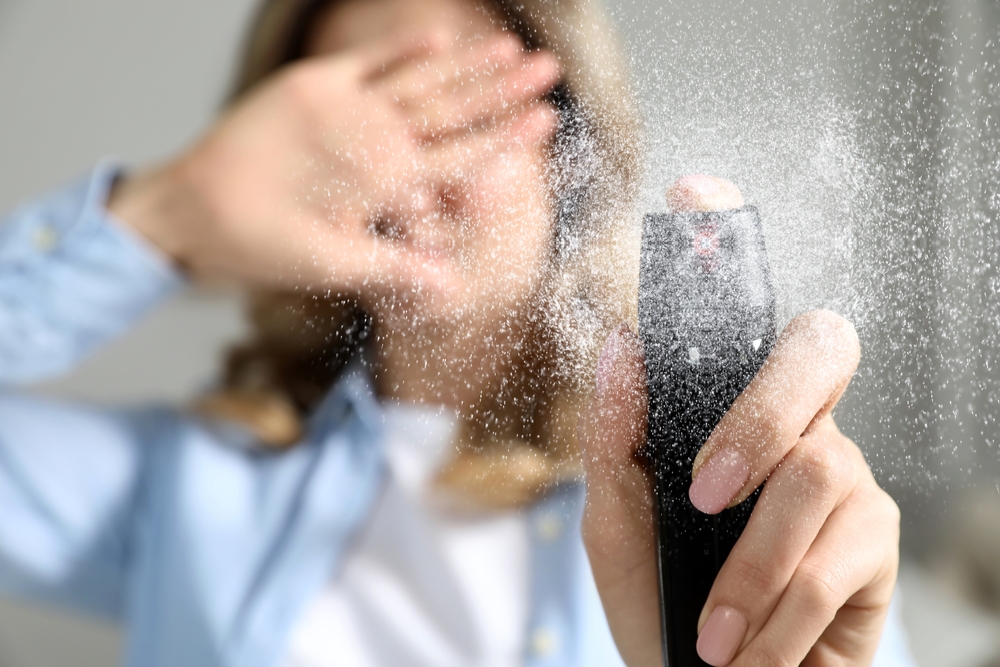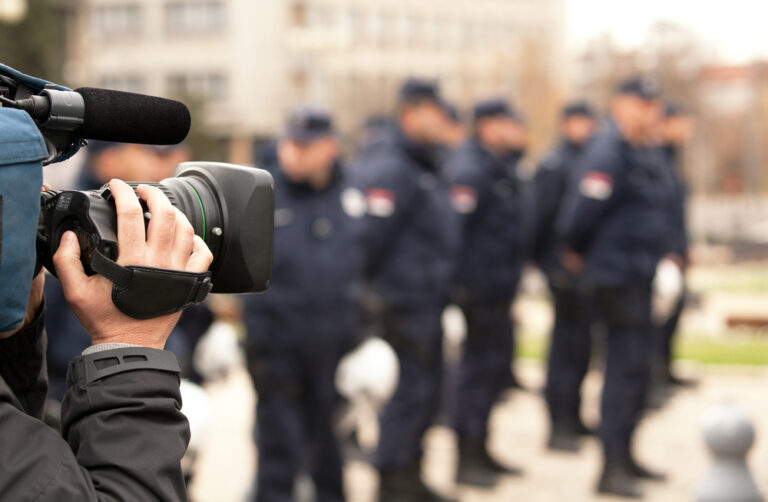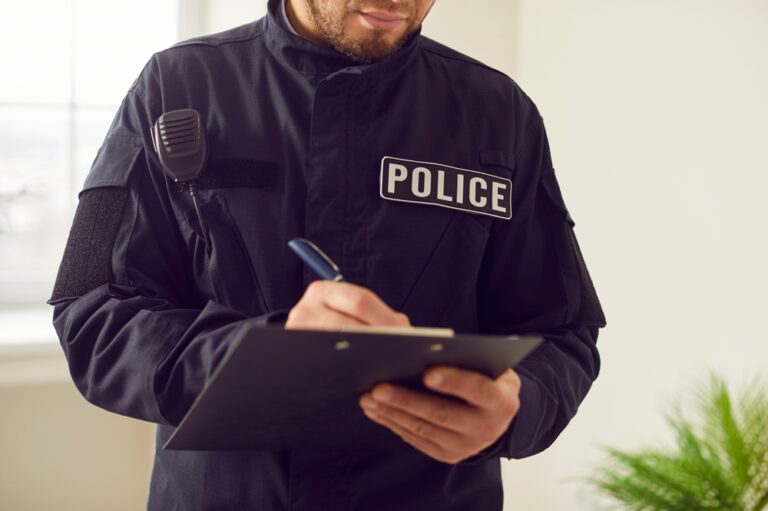
Police Tape 101: Everything You Need to Know
Police tape, commonly known as crime scene tape, is an important tool used by law enforcement to secure…

In the United States and other parts of the world, pepper spray is extensively used and regarded as a reliable self-defense weapon.
Law enforcers and civilians are allowed to carry it for handling unruly individuals and attackers.
There’s no doubt that exposure to pepper spray is not a pleasant experience.
What’s more, because pepper spray emits an oil-based material, it is difficult to remove, and its effects stay longer.
This reason is why it is important to learn how to get pepper spray off skin the proper way.
As you can imagine, it is a practical trick to know in case you find yourself exposed to its effects on the skin and other parts of the body.
People exposed to riot control agents like tear gas and pepper spray will experience several effects.
Typically, the discomfort manifests within 60 seconds after exposure and begins with respiratory and ocular symptoms.
A burning sensation, inflammation, and irritation of the eyes and respiratory tract are commonly experienced.
Other notable reactions to pepper spray exposure include severe breathing effects, coughing, chest pain, headache, and nausea.
Riot control chemicals seldom cause substantial eye harm, although it does happen.
Some of the severe ocular conditions associated with pepper spray exposure include conjunctivitis, photophobia, periorbital edema, and blepharospasm.
If a person has sensitive skin, conditions like rashes, erythema, subcutaneous edema, scaling, blistering, and first- to third-degree burns can happen.
Those exposed to high levels of spray pepper or in areas with less ventilation may experience more severe health effects.
The aforementioned effects are usually limited and may disappear within 30 minutes depending on the treatment applied.
However, people with asthma or other pre-existing lung conditions may experience more coughing and shortness of breath even after washing off the residuals.
Ocular vision usually reverts to normal quickly once the eyes are free from pepper spray and other contaminants.
However, erythema and photophobia may linger longer and may require professional medical attention for proper treatment.
A runny nose and excessive salivation might last about half a day, while headaches can last longer.
Oleoresin capsicum, the main active ingredient in pepper spray canisters, is usually an oil-based substance.
This means you can’t get rid of it by just using water or alcohol. Here are the steps for washing pepper spray out of your skin:
You need to avoid touching any other part of your body before you start washing to prevent spreading the OC oil inadvertently.
If you skip this step, you risk the possibility of contaminating other parts of your body that are not previously exposed.
Furthermore, avoid making contact with objects unless you need to.
For example, the pepper spray residue may linger on your phone, triggering the effects again once you touch it.
Wash the exposed area with a solution made from cold water and a detergent or dish soap.
Gently scrub your skin with it to allow the mixture to be combined with the OC. Then, wash the lather away with cool water.
Repeat this step with a fresh soap-water solution until the effects diminish.
While it can be effective on the skin, keep in mind that you shouldn’t use it on the eyes. Instead, use baby shampoo to cleanse them.
Preparing a saline solution is simple. All you have to do is put about 10 grams of salt into a liter of water.
Unlike the soap mixture in the previous step, saline solution can do wonders in cleansing the eyes.
Keep washing your skin with this solution until you notice significant improvements.
You can also combine water with an unflavored antacid to remove residuals if you are not satisfied with the saline solution.
This step may not require you to purchase something from a drugstore as they are common in residential kitchens.
See if you can find an olive or vegetable oil lying around and gently apply it to the affected spots.
Ensure you have a clean paper or cloth towel to wipe off the oil. Once done, your skin should be more reactive to soap and water.
If there’s still a good amount of pepper spray residuals on your skin, you may have to use medicated wipes.
They are designed to alleviate symptoms on skin with stubborn OC on its surface.
Because their purpose is primarily to remove pepper spray residuals, medicated wipes, in theory, are significantly effective.
If you don’t mind spending extra on supplies, having these wipes in your patrol bag at your disposal won’t hurt.
Depending on how effectively they can remove pepper spray on your skin, you may perform one of these steps or all of them.
For instance, the dishwasher soap solution might be enough, or it won’t do anything.
Regardless of how you choose to do it, be thorough in washing so that you don’t miss some spots.
If you are not certain which parts of your body or clothing are contaminated with OC, follow the below instructions.
Protesters can be unruly, especially if the subject of their protest is related to violence.
Other times, you will find them using pepper spray to counter anti-riot efforts.
When your hands are adequately covered, it is easier to treat yourself and others.
This way, you won’t have to worry about your hands being contaminated.
If you are wearing contacts, it would be best to remove them prior to removing pepper spray residuals.
You may need to ask for help if your hands are contaminated. OC residuals can cling to contact lenses, which makes cleaning more challenging.
It would be unlikely that your clothes are free of contaminants if exposed to pepper spray.
That’s why if you are expecting to get sprayed, bring extra clothing and a sealed plastic bag.
This way, you can ensure that the contaminated clothes won’t be in contact with other items until they are thoroughly washed.
If you got sprayed accidentally, you might wonder if there are legal repercussions for the person who did it.
In general, pepper spray is classified as a non-lethal weapon since it does not definitively inflict permanent injuries.
However, using it is not for all, as some states require certain conditions before a person is allowed to carry one legally.
For example, some states forbid its usage on anyone under the age of 18.
If you are sprayed without any warning or reasonable cause, you have the right to sue the person who used it.
To be successful in your case, there should be solid proof that the attack was deliberate. For example, you have a raw, unedited video of the incident.
You must also convince the jury that the individual did not act rationally.
Discuss it with your superiors or a lawyer if you feel you have a strong case against someone who pepper-sprayed you.
These legal experts can advise you if there’s a high chance of winning in court.
There’s no doubt that getting sprayed by OC is a nightmare to deal with. It could be worse if you are unsure what to do after the exposure.
Learning how to get pepper spray off skin is not relatively complex, provided you have the correct supplies and follow the instructions we laid out.
With patience and effort, you are more than capable of cleaning pepper spray residuals with ease.

Police tape, commonly known as crime scene tape, is an important tool used by law enforcement to secure…

The police are called daily regarding various incidents of public interest. It is our responsibility to provide the…

Many police officers experience terrible, traumatic events in the line of duty. A significant number of police officers…